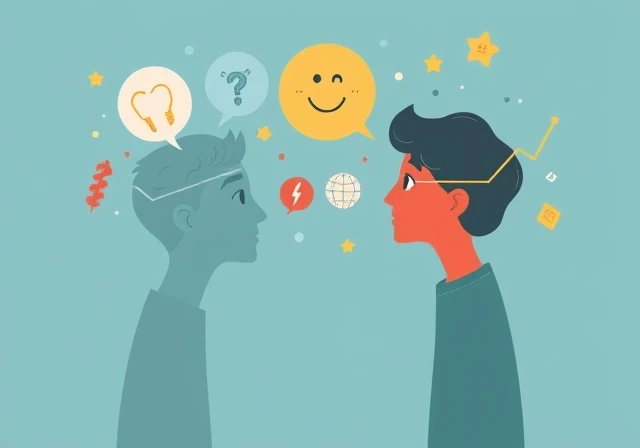Boost Your Emotional Intelligence: Simple Strategies for Success
How to Improve Emotional Intelligence?

Emotional intelligence (EI) is one of the most essentials skill one can have to boost his or her personal or professional life. It’s not just being mindful of your emotions but also understanding and learning how to deal with them. Improving one’s emotional intelligence can make a very significant difference in your relationships, communication and overall well-being. But before all of that…
What is Emotional Intelligence?
Before we get into how to improve it, let’s quickly cover what emotional intelligence is. Emotional intelligence refers to the ability to identify, understand, manage, and influence your emotions and the emotions of others. It’s about recognising how emotions affect people and using that awareness to guide your thinking and behaviour.
There are five key components of emotional intelligence:
- Self-awareness – Recognising your own emotions and how they affect your thoughts and behaviour.
- Self-regulation – Managing your emotions healthily and constructively, staying in control even in stressful situations.
- Motivation – Having a passion to work for internal reasons beyond money or status, being driven by things that make you feel fulfilled.
- Empathy – Understanding and sharing the feelings of others.
- Social skills – Building strong relationships, managing conflicts, and navigating social networks.
Why is emotional intelligence important?
Emotional intelligence helps you build stronger relationships, manage stress, communicate effectively, and handle conflicts, leading to improved personal and professional well-being.
Now that we know what emotional intelligence is, let’s talk about
how to improve Emotional Intelligence?
1. Self-Awareness
The first step in improving emotional intelligence is to become more self-aware. Self-awareness is about recognising what emotions you are feeling and understanding how they influence your thoughts and actions. When you’re aware of your emotions, you can respond to them more effectively.
A Harvard Business Review research found that teams with individuals who lack self-awareness tends to make worse decision compared to their counterparts. They also are less efficient at conflict management.
You can also keep a journal to track your emotions. Writing down how you feel throughout the day can help you notice patterns and triggers in your emotional responses, it offers a private and non-judgemental space to explore our emotions.
By acknowledging your weaknesses, you can build trust and transparency among your team. You can also own your professional development by knowing the areas in which you need to improve in order to advance your career.
Mindfulness encourages a shift in perspective, moving away from the constant “doing” mode of daily life and towards a state of “being” where we become more present and attuned to our internal experiences.
Through mindfulness, we become more aware of our habitual reactions to challenging situations.
2. Self-Regulation
Once you become more aware of your emotions, our next step is to develop self-regulation. Self-regulation means controlling your emotions, especially in challenging and problematic environments.
Mindfulness is one of the best methods to improve your self-regulation. Mindfulness involves staying present and aware of your thought-process and feelings. A few deep breaths, can help you feel relieved when overwhelmed or stressed.
Pausing before responding is one another method to which you can give a shot. When you’re in a situation that triggers a strong emotional response, take a moment to think before you respond. It can help you avoid impulsive and irrational behaviour.
Self-regulation refers to how you manage your emotions, behaviors, and impulses. The more self-aware you are, the easier this becomes; if you can recognize what you’re feeling and why, you can respond appropriately.
- Pausing Before Responding: Give yourself time to stop and think before immediately replying. This could be as simple as taking a deep breath and allowing for a 20-second pause so that your feelings get out of the way of your thoughts.
- Taking a Step Back: Sometimes, you might need to leave the room, and that’s OK. It’s often better to take a walk, drink some water, or call a friend than to make a snap judgment, send a scathing email, or lash out at your team.
- Recognizing Your Emotions:
Breathwork can contribute to greater emotional resilience, enabling individuals to recover more quickly from emotional challenges and maintain a more balanced emotional state.
- Box Breathing: This technique involves inhaling deeply for a count of four, holding the breath for a count of four, exhaling for a count of four, and holding the exhale for a count of four. This rhythmic breathing pattern helps to regulate the breath and promote a sense of calm.
- Extended Exhalation: The sources highlight the importance of extending the exhalation phase of breathing. Exhaling for a longer duration than the inhalation can be particularly effective in activating the parasympathetic nervous system and promoting relaxation.
- Diaphragmatic Breathing: This technique involves breathing deeply into the belly, engaging the diaphragm rather than just the chest. Diaphragmatic breathing helps to maximize oxygen intake and can have a calming effect on the nervous system.
3. Empathy
Empathy is a very important part that makes up emotional intelligence. Empathy means to understand and share what the other person is feelings at that moment. When you try to become more empathetic, you become better at connecting with people and responding to their emotional needs.
To improve your empathy, try to listen actively when someone is speaking. This means giving them your full attention and really trying to understand their perspective. Avoid interrupting or offering solutions right away. Instead, focus on understanding how the other person feels.
Another way to cultivate empathy is by putting yourself in other people’s shoes. Imagine what it would be like to be in their situation, and try to understand their emotions and reactions. This can help you respond more compassionately and thoughtfully to others.
According to a separate survey by Businessperson, 96 percent of employees rank empathy as important, but 92 percent say it’s undervalued. It shouldn’t be, though: Companies that prioritise empathy experience an increase in revenue, retention, and productivity.
4. Social Skills
Social skills is about building strong relationships and individuals with high emotinoal intelligence are good at communicating with each other, they are even better conflict resolution and understanding social cues.
To improve one’s social skill, one can start working on his or her communication> Be open to listen to others, communicationg is a two-way road, make sure you are talking and listening effectively
One of the most underrated skil of emotional intelligence is conflict resolution. IN any relationship, disagreements aer bound to happen, but it is how you handle them when the situation arises is the key to maintaining a healthy relationship.
Active Listening
Active listening is the process in which you gives full attention to what is being communicated, including the content of the message and the attitude that underlies it, the subtext behind it which is not being spoken, but conveyed.
To effectively practice active listening, controlling external and internal distractions is essential. In particular, managing the internal chatter in our minds and resisting the need to plan our responses will allow us to be fully present in the moment and sharpen our listening skills.
By actively listening to your employees and taking the time to understand their wants and needs, you can boost engagement, build trust, and more effectively coach them through challenges. The more your team feels appreciated, the more invested they’ll be, which, in turn, leads to higher morale and stronger company culture.
Perspective-taking:
Practice putting yourself in other people’s mind to see their interests and needs to develop your ability to understand their point of view.
Consider their backgrounds, experiences, and motivations to gain a deeper understanding of their thoughts, feelings, and behaviors.
This can enhance your empathy and improve your ability to navigate social situations with greater sensitivity.
5. Emotional Resilience
Emotional resilience is the ability to keep going despite the setbacks and challenges you face in your life. Life is full of randomness, it is full of ups and downs, and emotional resilience helps you navigate through tough times without having a significant effect on your emotional well-being.
We can build emotinal resllence, by re-framing negative situation. Try to see every problems as challenges? Every mistake as an opportunity to learn and grow. When things don’t go as planned, ask yourself, “What can I learn from this?” This mindset can help you stay positive and keep moving forward.
It’s also important to take care of your mental and physical health. Exercise, sleep, and nutrition all play a huge role in how we manage our emotions. When you feel good physically, you’re better able to handle stress and bounce back from challenges.
6. Practice Self-Empathy with Yourself
While it’s important to practice empathy toward others, it’s also crucial to be empathetic toward yourself. Self-compassion is about being kind to yourself when you make mistakes or experience difficult emotions. Instead of criticising yourself, try to treat yourself with the same care and understanding you would offer a friend.
When you’re feeling down or frustrated, take a moment to acknowledge your feelings and remind yourself that it’s okay to not be perfect. Practice self-compassion by saying things like, “It’s okay to feel this way,” or “I’ll do better next time.” This can help you build emotional resilience and improve your overall emotional intelligence.
7. Take Responsibility for Your Emotions
Taking responsibility for your feelings and emotions means you are the one who is in charge and is in control, you know and understand how to react to situations. It’s very easy to blame others for how you feel, but the truth is, your emotions are a reflection of your thoughts and beliefs.
To improve your emotional intelligence, you can start by taking responsibility of everything, i mean literally everything… Take responsibility of feeling sad or any other emotion. Ask yourself why you feel that way. Is it because of a past experience? Is it because of your own beliefs or expectations? By understanding the root cause of your emotions, you can better manage your reactions and respond in a more balanced way.
To Wrap It Up
Improving emotional intelligence is a continuous journey. By practising these techniques each and everyday one can enhance your emotional intelligence and lead a more fulfilling life.
Remember that emotional intelligence isn’t something you’re born with… it’s a skill that can be developed over time. So take it one step at a time, be patient with yourself, and celebrate the small wins along the way. With effort and dedication, you’ll notice the positive impact it has on your relationships, career, and overall well-being.
